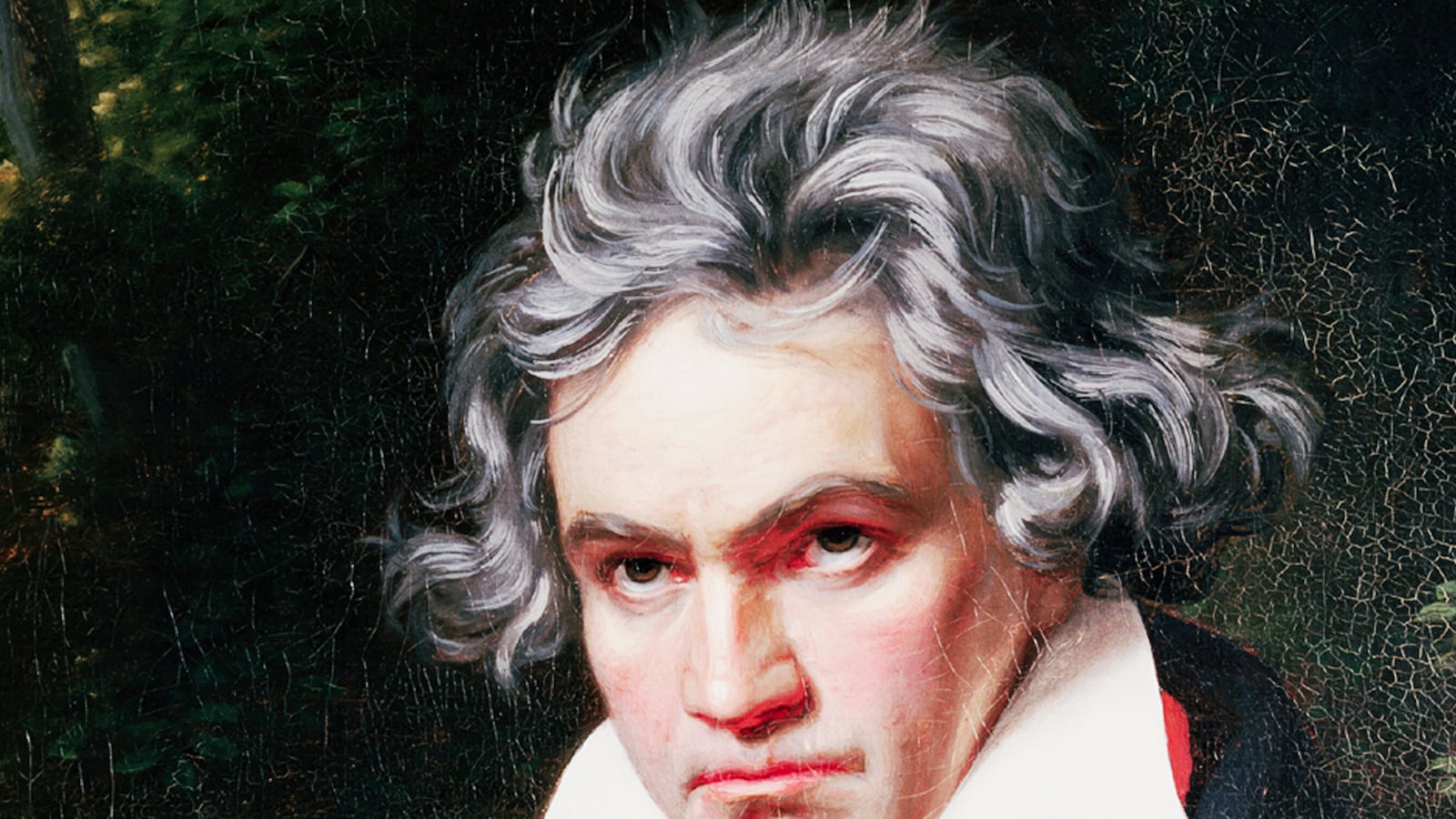At one o’clock in the morning on December 5, 1791, an event occurred that went largely unnoticed in Vienna and caused much sadness in musical circles in Bonn—an event that would have caused Beethoven considerable grief, and is still being mourned today.
Wolfgang Amadeus Mozart died at the age of thirty-five. It is not an exaggeration to say that Beethoven, who turned twenty-one less than two weeks later, was soon being talked of as Mozart’s natural successor. As performer his virtuosity was unquestioned and unparalleled. As composer he now had a substantial number of works, in a variety of genres, to his name.
One man recognized that more than any other. He was in London when the sad news reached him, but he kept his promise to pass through Bonn on his return to Vienna. In July 1792 Beethoven once again met Joseph Haydn, now Europe’s unquestioned preeminent musician. Haydn was sixty years of age, and a good enough musician to recognize that he belonged to an older generation and that new blood was needed. More than that, he was prepared to do something about it.
A breakfast meeting was arranged between Haydn and members of the court orchestra at Bad Godesberg, close to Bonn. Beethoven was present, and no doubt remembering Haydn’s suggestion at their last meeting, had the manuscript of his Cantata on the Death of Emperor Joseph II with him. Haydn asked to see it. He studied several pages, finally confessing himself very impressed. He urged Beethoven to continue his studies.
By the time Haydn left Bonn shortly after, there was a clear commitment that if Beethoven could find his way to Vienna, he, Haydn, would give him lessons. We do not know how this was viewed by the people around Beethoven, his mentors Count Waldstein and Christian Neefe, or most importantly his employer, the Elector, who would not only have to give Beethoven permission to take leave of absence, but also subsidize the trip. It was summer, certainly, and court duties were light, but come autumn the new opera and theatre season would have to be prepared and then got under way. There was not much Beethoven could do in the few weeks before then. But if it was to be a longer stay, how likely was it that the Elector would grant leave of absence to a young man who had by now made himself such an indispensable member of musical life at court?
Not for the first time, extraneous events worked in Beethoven’s favor, though he must have been the only resident of Bonn for whom this was true. In October 1792 the French Revolutionary Army invaded German territory and marched towards the Rhine.
On the 22nd they took Mainz and headed north. The towns and cities of the lower Rhine were at their mercy. Those who could fled. It was decided that the Elector and his family should leave Bonn.
In the chaos of evacuation, the question of whether or not Beethoven should be allowed to go to Vienna paled somewhat. We do not know exactly what happened, but almost certainly Count Waldstein seized the moment to secure the Elector’s agreement for Beethoven to go to Vienna, possibly for six months, maybe for a year.
Beethoven did not need telling twice. He immediately began making preparations. We do not know how he told his father, or what his father’s reaction was. Probably he presented it as a fait accompli, in the knowledge that his two brothers, now in their mid-and late teens, would take over responsibility.
Before leaving, Beethoven made the rather charming decision—or maybe it was made for him—to fill an autograph book with messages from close friends. This book has survived, and is rather more surprising for what it does not contain than for what it does.
Only fourteen friends have signed it, none of them musical colleagues, many with names that do not feature in any of the literature. Christian Neefe did not sign it. It seems to give the lie to Junker’s assessment of Beethoven’s popularity among his fellow musicians. On the other hand, it is always possible that he had another book for musicians, or that shyness prevented him from approaching everyone he would have liked to.
One notable omission is Stephan von Breuning, to whom he had given piano lessons and with whom he had formed a close friendship. The two youths—Beethoven was the elder by nearly four years—spent a lot of time together, and their friendship was to be the closest, and longest lasting, of Beethoven’s life. It was to last, literally, until Beethoven’s death.
Stephan was to follow Beethoven to Vienna—why, then, is he absent from the autograph book? We do not know. It might be simply that he was away at the time, because Beethoven would be gone within days.

Stephan’s sister Eleonore most certainly does feature in the autograph book, and thereby, I am convinced, hangs a tale. We are in the realms of conjecture now, but I make no apologies for what follows. It is a subject that has not been accorded much space by previous biographers, but I believe that to ignore it leaves us with an incomplete picture of an adolescent Beethoven.
Where are the young women in Beethoven’s narrative? Conspicuous by their absence. Girls do not feature greatly in his pubescent years, but it was not, apparently, for want of trying. According to his boyhood friend Franz Wegeler, “There never was a time when Beethoven was not in love, and that in the highest degree.” In this period, in his adolescence, as well as in his entire adult life, he would fall in love with females who were simply not available. It is a consistent pattern, to such an extent that you have to wonder if it was a deliberate course of action on his part, as if he was somehow fearful of the commitment it could lead to. But in the early years, this was clearly not the case. He was certainly more than anxious to have an amorous relationship.
There was a certain Jeanette d’Honrath, from Cologne, a friend of Eleonore who would come to Bonn and stay with her. Wegeler describes her as ‘a beautiful, vivacious blonde, of good education and amiable disposition, who enjoyed music greatly and possessed an agreeable voice’. She was clearly well aware of Beethoven’s attraction to her, because she used to sing him a teasing little song, of which the words lamented her being separated from him, and being unable to prevent this, which was too hurtful for her poor heart. We do not know how Beethoven reacted to this. Suffice it to say she went off and married a soldier who later rose to the rank of field marshal.
Then one Fräulein von Westerholt, whom Beethoven took on as a pupil and with whom he fell in love with such a passion that Wegeler discreetly calls her just ‘Fräulein von W.’ and Romberg was telling tales of his friend’s unrequited love forty years later. Fräulein von Westerholt became Frau von Bevervörde.
Beethoven and his friends frequented a tavern near the town hall in Bonn called the Zehrgarten, run by a certain Frau Koch, assisted by her beautiful daughter Babette. It is certain that Beethoven was attracted to her. Whether he tried to pursue this we do not know, but if he did he was clearly disappointed, since he wrote from Vienna shortly after arriving that he was hurt she hadn’t replied to his letters.
It was around this time that an incident occurred that perhaps best—and most painfully—sums up Beethoven’s lack of success with girls.
One evening he was in a restaurant with a number of the younger members of the court orchestra. There was a particularly attractive young waitress, and they persuaded her to tease Beethoven and flirt with him. This she did (we are not told how), and Beethoven reacted with ‘repellent coldness’. They encouraged her to flirt more.
Finally Beethoven lost patience and ‘put an end to her importunities with a smart box on the ear’.
This merits slightly closer examination. Why would his colleagues do this, if they did not already know of his gaucheness with girls? Had some of them previously witnessed his attempts at seduction? If so, the attempts must have failed. Clearly alcohol was flowing when they put the waitress up to her antics, but that would simply have exaggerated what they all knew already—that Beethoven was pretty hopeless when it came to girls.
More importantly, can we really believe that a twenty- or twenty-one-year-old Beethoven would strike a girl? Or is the teller of the tale merely using a euphemism? We cannot be sure. But this was clearly no simple prank. It was calculated to upset Beethoven, and upset him it did. It must also have deepened a certain self-loathing he is bound to have had over his inability to acquire a girlfriend.
Which leads us back to Eleonore von Breuning, Lorchen as she was known, and the speculation I shall now indulge in. I am assuming that in order to have his autograph book signed, Beethoven went to the Breuning house on the Münsterplatz with which he was so familiar. He found Stephan out or away, but Lorchen was there, alone. He asked her to sign his autograph book.
This she did, choosing to write three lines by the German poet and philosopher Johann Gottfried Herder. They read:
Friendship with that which is goodGrows like the evening shadowsUntil the sunshine of life finally sinks.
She signed it: Bonn, 1 November 1792, your true friend Eleonore Breuning.
Hardly an overwhelming declaration of affection, in fact bordering on the formal. Compare this with a birthday card she presented him with one year earlier. Two four-line verses wishing him happiness and long life, and in return asking from him, her piano teacher, kindness, patience, and favour. She drew round the verses a garland of flowers, and signed it with her pet name, Lorchen.
What had happened? I am convinced Beethoven fell in love with Lorchen very soon after beginning to teach her. I believe that, at some point in his teenage years, he expressed this to her, and that later—in between the birthday card and the autograph book—he put his feelings into action with an attempted kiss, which she rejected.
Now, alone in the house with her, about to leave for Vienna, he made—I believe—one more attempt to show his affection. I imagine he made an ungainly lunge at her, which she again rejected and which left her seriously upset.
How else to explain the language he used in a letter to her written a full year after arriving in Vienna.
“Although it has been a year since you have heard from me, you have been constantly and most vividly in my thoughts, and very often I have conversed in spirit with you and your dear family, though frequently not as calmly as I should have wished. For whenever I did so I was always reminded of that unfortunate quarrel. My conduct at that time really was quite detestable. But what was done could not be undone. Oh, what I would give to be able to blot out of my life my behaviour at that time, behaviour which did me so little honour, and which was so out of character for me … It is said that the sincerest repentance is only to be found when the criminal himself confesses his crime, and this is what I have wanted to do. So now let us draw a curtain over the whole affair.”
Eleonore, it seems, was prepared to forgive him, to an extent. She sent him a hand-knitted neckcloth (he had asked her to send him something made by her hands). But he is still tortured by guilt, no doubt made worse by the fact that he now knew that Eleonore had formed a close friendship with his friend Wegeler, and that the two would soon be married.
“The beautiful neckcloth, your own handiwork, came as a lovely surprise to me … But it also made me sad, awakening memories of things long past. Also your generous behaviour made me feel ashamed. Indeed I could hardly believe you would think me still worth remembering … I beg you to believe, my friend (please let me continue to call you friend), that I have suffered greatly, and am still suffering, from the loss of your friendship … I know what I have lost and what you have meant to me. But if I were to attempt to fill this gap, I would have to recall scenes which you would not be happy to hear about, and I would not be happy to describe.”
I rest my case.
The most important entry in Beethoven’s autograph book, without question, is that written by the man who had done more to further Beethoven’s musical ambitions in Bonn than any other, Count Waldstein. In fact his entry has earned him a certain immortality.
For the first time in Beethoven’s life, his name is linked in writing with music’s two greatest contemporary names (though the reference to Haydn is a trifle barbed).
Dear Beethowen! [sic]You journey now to Vienna in fulfilment of your long frustrated wishes. The Genius of Mozart is still in mourning and she weeps for the death of her pupil. With the inexhaustible Haydn she has found refuge but no occupation. Through him she now wishes to be united with someone else. With persistent hard work you shall receive: Mozart’s Spirit through Haydn’s Hands.
Beethoven left Bonn at six o’clock on the morning of Friday, 2 November (the morning after the encounter with Eleonore von Breuning), carrying a large amount of musical scores, finished and unfinished, and little else. The journey was not without danger. At one point the coach driver whipped the horses into a gallop and drove right through the Hessian army.
The coach drove south along the river, turning east at Ehrenbreitstein, the hometown of Beethoven’s mother. He would certainly have taken a last look at the Rhine, expecting to see it again in six months or a year.
He never saw the Rhine, or Bonn—or, indeed, Eleonore von Breuning—again.
Copyright © 2012 by John Suchet. Reprinted with permission of Grove/Atlantic Press.






